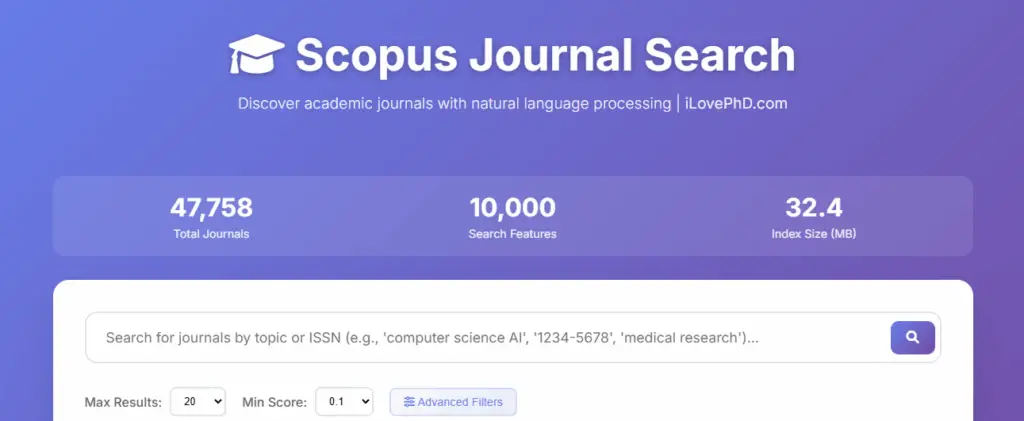Finding the right journal for your research is one of the most important steps before publishing. The Scopus Journal Search by iLovePhD is a free, AI-powered platform designed to help researchers identify Scopus-indexed journals quickly and accurately. Whether you’re a PhD scholar, early-career researcher, or experienced academic, this tool saves you time and enables you to choose journals that meet international publishing standards.
ilovephd.com
Scopus Journal Search
Why Use Scopus Journal Search by iLovePhD?
- Covers 47,758 journals from all academic fields.
- Uses Natural Language Processing (NLP) for easy, human-like searching.
- Offers custom search parameters for precision results.
- Completely free to use for global researchers.
Key Features at a Glance
| Feature | Details |
|---|---|
| Database Size | 47,758 Scopus-indexed journals |
| Search Modes | Natural language or keyword-based |
| Custom Results | Show 10, 20, 50, or 100 results |
| Precision Control | Min Score: 0.05 to 0.3 |
| Filters | Publisher, Journal Type, Open Access, ASJC Codes, Language |
| Popular Topics | AI, Medicine, Nanotechnology, Climate Change, Finance, etc. |
| Languages Supported | English, Spanish, French, German, Chinese |
Step-by-Step: How to Use the Tool
Step 1: Open the Tool
Go to https://scopus.ilovephd.com/.
You’ll see a clean, simple search interface.

Step 2: Enter Your Search Query
- Type your research area or topic.
- Example: “Artificial Intelligence”
- No need for complex Boolean queries — just type naturally.
Step 3: Adjust Search Settings
You can customize results with:
- Max Results – Choose 10, 20, 50, or 100.
- Minimum Score – Set between 0.05 and 0.3 for relevance.
Pro Tip:
- Low score = more journals (broad search)
- High score = fewer but highly relevant journals
Step 4: Use Advanced Search Filters
- Publisher Filter – Search within Elsevier, Springer, etc.
- Journal Type – Journal, Book Series, Conference Proceedings.
- Open Access – Any, Full OA, Hybrid, Subscription.
- ASJC Codes – Example: 1702 Artificial Intelligence, 2718 Medicine.
- Language – Any, English, Spanish, French, German, Chinese.
Step 5: Explore Popular Topics
For quick searches, click from 15 popular research categories:
- AI, Nanotechnology, Medicine, Genetics, Quantum Mechanics, Renewable Energy, Psychology, Economics, Mathematics, etc.
Step 6: Review Journal Details
Each result includes:
- Publication Status
- Publisher Name
- Type (Journal / Conference / Book Series)
- ISSN & eISSN
- Coverage Years
- Open Access Information
Step 7: Verify Before Submission
While the tool is accurate, always:
- Visit the journal’s official website
- Check latest indexing in Scopus
- Review author guidelines
Example Search: Artificial Intelligence
A search for “Artificial Intelligence” returns 20 relevant journals, such as:
- Artificial Intelligence (Elsevier B.V.) – Since 1970
- Artificial Intelligence in Medicine (Elsevier B.V.) – Medical AI applications
- International Journal of AI in Education (Springer US) – AI for teaching
- Engineering Applications of AI (Elsevier Ltd) – Applied AI research
- Computers and Education: AI (Elsevier B.V.) – Open access
Benefits for Researchers
- Saves Time – Quickly find the right journal.
- Ensures Quality – All journals are Scopus-indexed.
- Supports Global Access – Free to use anywhere.
- Encourages Discovery – Find journals you may have missed.
FAQs
Yes, it’s completely free for all researchers.
Yes, the database contains only Scopus-indexed publications.
Yes, you can search and filter for English, Spanish, French, German, and Chinese publications.
The tool is highly accurate, but always verify on the journal’s official website.
Yes, you can filter results by Open Access type.
Popular Searches to Find this Tool
Scopus journal search, Scopus indexed journals, how to find Scopus journals, free journal finder, academic publishing tools, ilovephd tools
Conclusion
The Scopus Journal Search by iLovePhD is more than just a search engine — it’s a smart academic publishing assistant. With 47,758 journals, advanced filtering, and natural language search, it helps researchers choose the right journal with confidence.
If you want to save time, improve your chances of publication, and make informed decisions, bookmark https://scopus.ilovephd.com/ and use it for your next research submission.